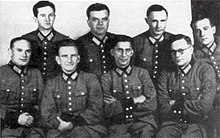| Schutzmannschaft Battalion 201 | |
|---|---|
 Schutzmannschaft Battalion 201 leaders, with Roman Shukhevych (sitting, second from left), 1942 | |
| Active | late October 1941 – December 1942 |
| Country | |
| Branch | Sicherheitspolizei |
| Type | Battalion |
| Role | Security police |
| Size | 650 |
| Engagements | Anti-partisan operations in Belarus, Holocaust in Belarus |
| Commanders | |
| Notable commanders | Yevhen Pobihushchyi-Ren Roman Shukhevych (deputy commander)[1] |
The Schutzmannschaft Battalion 201 was a World War II Ukrainian Schutzmannschaft auxiliary police battalion formed by Nazi Germany on 21 October 1941,[2] predominantly from the soldiers of Ukrainian Nachtigall Battalion dissolved two months prior and the Roland Battalion.[2] The battalion was part of the Army Group Centre that operated in Belarus.[1]
Nachtigall was an intelligence and diversion group of Abwehr,[1] but according to other historians[according to whom?] a Security Police unit, composed almost exclusively from members of the OUN(b), who were transported from Vinnytsia to Neuhammer on 13 August 1941 and disarmed at gunpoint due to political disagreement with the German leadership.[2] Historian Frank Golczewski says the Battalion fought against partisans and participated in the Jewish genocide in Belarus.[3] According to historian John-Paul Himka no one has specifically studied the activities of Schuma 201 in relation to the destruction of the Jewish population. But we do know – wrote Himka – that the Germans routinely used the Schuma battalions in Belarus both to fight partisans and to murder Jews.[4][5]
Battalion 201 numbered 650 persons, most of whom belonged to Stepan Bandera’s wing of the Organization of Ukrainian Nationalists. It served for a year in Belarus before being disbanded.[6] Roman Shukhevych, the supreme commander of the UPA from 1943 to 1950 was an officer of the battalion.
Many of its members, especially the commanding officers, would later be recruited into the Ukrainian Insurgent Army.
- ^ a b c Kentiy, A. Roman Shukhevych. Encyclopedia of History of Ukraine. 2013
- ^ a b c Cite error: The named reference
Rudlingwas invoked but never defined (see the help page). - ^ Thomas Schlemmer; Alan E. Steinweis (2016). Holocaust and Memory in Europe. Walter de Gruyter GmbH & Co KG. p. 124. ISBN 9783110470147.
Battalion 201, sent to Belorussia for a year, fought against partisans and participated in the Jewish genocide.[p.312]
- ^ Cite error: The named reference
Rudling-conferencewas invoked but never defined (see the help page). - ^ Cite error: The named reference
bramawas invoked but never defined (see the help page). - ^ І.К. Патриляк. Військова діяльність ОУН(Б) у 1940—1942 роках. — Університет імені Шевченко \Ін-т історії України НАН України Київ, 2004, pp 371-382. (No ISBN)